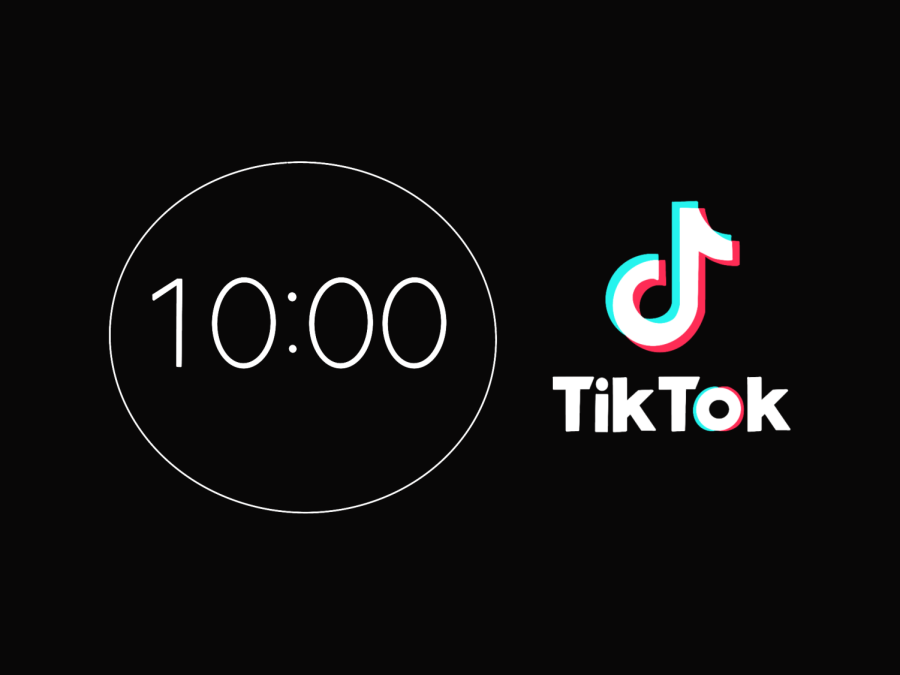Opinion: A 10-minute video is a damn TEDTok — and an ideal venue for misinformation
TikTok’s choice to extend the maximum video length to 10 minutes will exacerbate the already rampant spread of misinformation on the video-sharing app.
TikTok has recently announced plans to extend the maximum video duration to 10 minutes. The platform captures the short attention span of the modern audience, but can also become a venue for misinformation. (Staff Illustration by Susan Behrends Valenzuela)
March 2, 2022
I love quickness and efficiency; therefore, I love TikTok. I can watch 15-second videos for hours on end. The digestible clips fill periods of procrastination, times of sadness, and those 10 minutes between waking up in the morning and getting up in the morning.
Perhaps my love of TikTok is numbing my brain — the algorithm is so in sync to my wants and needs that I should worry — but I am too happy to question it. If I need to laugh, TikTok is there for me. If I need to cry, I am positive that there’s a video waiting to pop up on my screen that will help me do just that. If I need to find a restaurant for dinner with my friends, I know I can turn to the little black icon with a white, pink and turquoise music note. My love for TikTok is very much dependent on its short-and-sweet tendencies, so following its announcement that it will allow videos of up to ten minutes, I have a few grievances with the clock app.
TikTok has truly set the standard for what users want to see. Instagram and YouTube have even copied the short video format with Reels and Shorts, respectively. So why is TikTok encroaching on YouTube’s territory? TikTok made this shift to “unleash even more creative possibilities for our creators around the world,” as a spokesperson for the company told NBC News, but isn’t that what YouTube is for?
Though I know that TikTok, like any company in our capitalist world, exists to make a profit, the accuracy of the For You page makes me feel like it exists for me. I hate to say it, but I don’t have the attention span for a 10-minute video. I cannot watch anything on a larger device without constantly consulting my phone for a quicker approach to entertainment. Gen Z is said to have an eight-second attention span, so a 10-minute video is 75 times too long for our taste. This change is not user-friendly, but even worse, it makes spreading misinformation on TikTok even easier.
TikTok has been a hub for misinformation on COVID-19 because of how easy it is to spread conspiracies in a digestible short clip on an app available in 154 countries.
“Misinformation is literally landing people in the hospital, literally killing people,” said Dr. Eric Burnett of Columbia University, who posts on TikTok as @dr.eric.b, in an NYU Global Public Health article.
As the COVID-19 pandemic continues to spread, so does vaccine misinformation. With war in Europe at the top of everyone’s Twitter feeds, lengthening the amount of time that content creators are given to spread lies across the world is a dangerous move.
Any person of age can make a video about any subject on TikTok — there is no vetting process or expertise necessary. The blue checkmark that denotes someone as a verified user helps prevent impersonation, but not much else. TikTok has not existed long enough to have had leverage or influence in a major international conflict, so the current Russia-Ukraine conflict will set a precedent for how the social media company handles potentially dangerous misinformation.
TikTok users quickly got involved in Russia’s invasion of Ukraine, passing off old videos as recent clips. Users have reused audio of gunshots to give viewers an impression of the war that is completely separate from reality. TikTok has intervened, but not quickly enough. With one billion global users, there is no way for the company to closely monitor each one’s usage and content.
Misinformation being spread as a three-minute clip is dangerous, but the increase to 10 minutes can and will have a substantial impact on global consciousness, given the platform’s reach. The new format gives a platform to longform deep fakes, clips taken out of context and straight-up lies — blurring the lines between truth and misinformation even more.
“We continue to closely monitor the situation, with increased resources to respond to emerging trends and remove violative content, including harmful misinformation and promotion of violence,” TikTok spokesperson Hilary McQuaide told NPR on Monday regarding misinformation on the Russian invasion of Ukraine.
The app does offer a digital literacy hub for users to learn more about the conscious use of social media and distinguishing between accurate and inaccurate information. However, deceptive videos gain traction before they are removed from the app, and that in itself is dangerous. Oftentimes, misinformation is so convincing that to some it becomes the truth.
TikTok can be the happiest place on the internet, or it can be a breeding ground for misinformation. Its user-friendly interface and vast user base creates an atmosphere in which viewers are too likely to trust whatever content finds them. Luckily, our short attention spans might hinder us from watching the full 10 minutes of misinformation, but an engaging (but untrue) opening could easily capture our attention. A deepfake of Putin announcing a retreat from Ukraine or of Biden saying vaccines have microchips could spread, and the speed at which this happens might be too much for TikTok’s internal team to curb.
TikTok, I love you. I love your restaurant recommendations and your videos of pets. I even love your niche political sectors. I fear that you are taking advantage of my love. You’re making me concentrate for longer and endangering me with misinformation. So TikTok, I plead that you salvage our relationships and strike a balance between longform and shortform — and between entertainment and misinformation.
Views expressed in the Opinion section do not necessarily reflect those of WSN, and our publication of opinions is not an endorsement of them.
Contact Alexandra Cohen at [email protected].

























































































































































